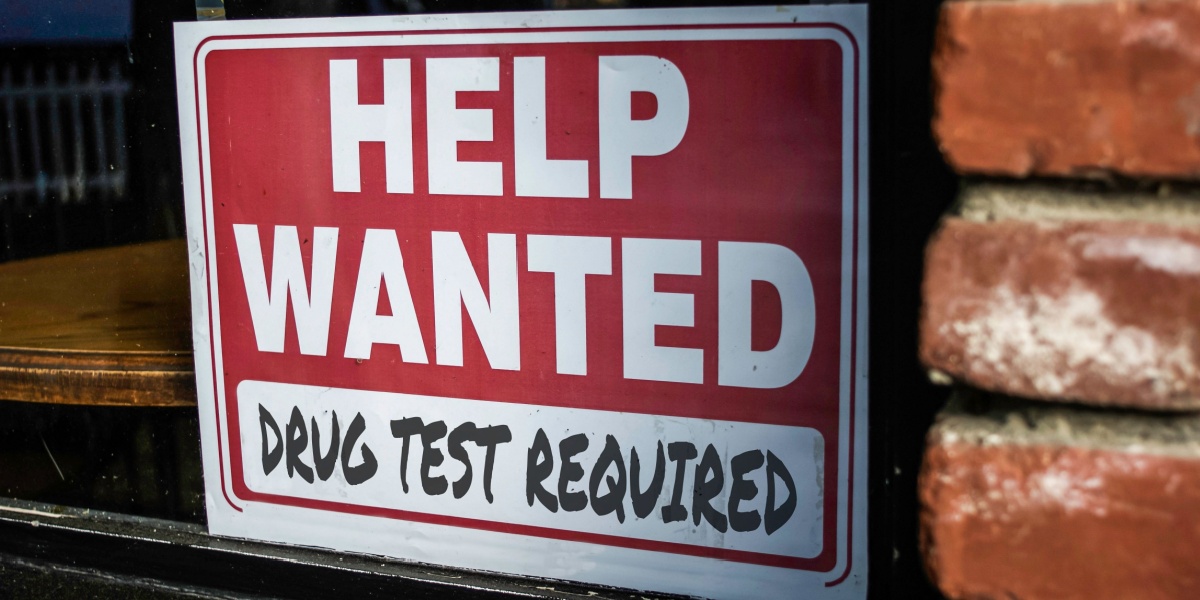Some employers request applicants to complete a drug test before being hired for a position. In some instances, this is mandatory by federal law, while in others it can be a decision made by the employer. Laws and procedures around pre-employment drug testing can vary from state to state and can depend on the specific type of employment.

What is pre-employment drug testing?
Pre-employment drug testing involves checking a potential employee for recent drug use upon application to the position or as a condition of employment. There are federal and state laws around this, so the policies and procedures can vary. Some positions hold drug testing as a mandatory requirement, while others might include these tests at the discretion of the employer.[1]
The reason that employers complete pre-employment drug testing is to ensure the safety of the individual and other employees, increase and maintain productivity, increase employee safety, and prevent repeated absences from work. The research on this topic varies, but there is evidence to suggest that substance users are more likely to be involved in avoidable accidents, are less productive, and have more time off work.[2][3]
For a full rundown on how to create a drug-free workplace, visit our Drug and Alcohol Resources for Employers page.
When pre-employment drug testing is mandatory
Some job roles require pre-employment drug testing as a federal law, such as individuals working within the Department of Transportation and the Department of Defense. This includes positions involving driving or operating heavy machinery, such as aviation, railroad, and nuclear agencies, and positions involving access to sensitive and classified information. [1][4]
Generally, pre-employment drug testing outside of these positions is not mandatory. However, some state laws and individual employers require pre-employment drug testing for various other positions, including: [4]
- Roles in which firearms or weapons are used
- Positions in prison and correctional facilities
- Healthcare and hospital positions
- Positions within schools or school transportation
Pre-employment drug testing sample types
There are various types of drug tests, each of which involves a different procedure and can take varying lengths of time to produce results. The most common type of drug test used in the US is a urine sample. Drug tests include: [4][5]
- Urine: Urine tests are very quick to complete, with results available in one to three days. They can test for drug use within the past five to ten days.
- Saliva: Saliva tests are also very quick and involve a simple procedure, with results available within hours. They can only detect drug use from within the past 48 hours.
- Blood: Blood tests are fairly invasive procedures that take several minutes, and results can be available within a few days. They can detect substances in the blood at the time of testing and used within the previous few hours.
- Hair: Hair testing is a quick procedure and results can take a week or longer to be available. This can detect drug use from within the previous 90 days.
- Breath: Breathalyzers can be used to detect current alcohol levels and produce results within minutes.
What substances are usually tested for in pre-employment drug tests?
Most pre-employment drug tests will be 5-panel tests, which check for: [6]
However, there are several different types of drug tests, ranging from 5 panels to 14 panels. A 5-panel test can check for the presence of a whole class of drugs. For example, amphetamines can include methamphetamine, MDMA, and ADHD medications, such as Adderall. [1]
Drug tests with a larger number of panels can test for the presence of specific substances within each class, along with additional substances, such as: [1][7]
- Benzodiazepines
- Barbiturates
- Methadone
- Propoxyphene
- Morphine
- Codeine
- Heroin
- Hydrocodone
- Oxycodone
- Ecstasy and MDMA
- Tramadol
- Demerol
Pre-employment drug testing legality
Companies must adhere to federal or state laws when conducting pre-employment drug tests. These can vary, but will typically involve: [4][6]
- Having clearly defined policies and procedures
- Ensuring the applicant is aware of drug testing requirements before applying for the role
- Using certified laboratories, tests, and healthcare practitioners
- Ensuring employees’ rights are upheld, including adhering to discrimination and disability acts
Who is allowed to perform a pre-employment drug test?
Healthcare practitioners can conduct pre-employment drug tests. Many companies utilize occupational health departments to conduct these tests, as they have a more in-depth knowledge of the company’s requirements and consequences. [6]
Tests must be sent to certified laboratories to be checked and interpreted by Medical Review Officers (MROs), who are trained and qualified in federal drug-testing regulations. [8]
Other types of employment drug testing
Along with pre-employment drug testing, employers can use their discretion and drug testing policies to conduct drug tests at other times. This includes random or periodic tests, post-accident, when there is reasonable suspicion, on returning to duty, or as a follow-up. [1][8]
The use of these tests must be detailed in the company’s drug testing policy and cannot be used to discriminate against employees based on characteristics such as race, gender, or background. [1]
Random
Employees can be selected at random, at an unspecified time, to be tested for drug use.
Periodic
Company policies can include a regular drug test for all employees, such as once per quarter or once annually.
Post-accident
Following an accident or unsafe practices at work, an employer can test employees involved for drugs and alcohol to determine if this contributed to the accident.
Reasonable suspicion
If the employer has reason to believe that an employee is under the influence of drugs or alcohol, such as appearing unfit for duty or behaving unsafely, then they can conduct a drug test.
Return-to-duty
If an employee has been off work for drug and alcohol treatment or after violating the company’s drug policy, the employer may request a drug test when they return, to determine if they are fit for work.
Follow-up
A follow-up test may be conducted following a failed test or violation of the policy. This would usually be conducted shortly after the return-to-duty test as an additional screening.
Pre-employment drug testing FAQs
Can I refuse a pre-employment drug test?
Generally, an employer will remove their job offer if you refuse to complete a pre-employment drug test. It is usually treated in the same way as a failed drug test. [1]
What happens if I fail my pre-employment drug test?
If you fail your pre-employment drug test, you will likely have your conditional job offer removed. [4]
In some cases, the MRO or occupational health department will contact you to ask about your prescription medications, to determine if a positive result is due to a legal and necessary substance, although this may not change the outcome. [1]
What if I think the result is incorrect?
You can dispute the results if you feel they are inaccurate or a false positive has occurred and may be asked to show evidence or information to back up your case. You might also want to hire legal representation to help with this case. [4]
Can I retake the pre-employment drug test?
If you request a retest after a failed test, your original sample may be retested at your own cost. You will not be able to send a new sample to be tested. [1]
Does everyone applying for the same job receive the same test?
Yes, employers must conduct the same drug tests on everyone applying for the same role and cannot discriminate or differentiate between applicants. [6]


-guide-detail.jpg?v=1722503514)
